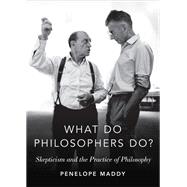
What do Philosophers Do? Skepticism and the Practice of Philosophy
by Maddy, PenelopeBuy New
Buy Used
Rent Textbook
Rent Digital
How Marketplace Works:
- This item is offered by an independent seller and not shipped from our warehouse
- Item details like edition and cover design may differ from our description; see seller's comments before ordering.
- Sellers much confirm and ship within two business days; otherwise, the order will be cancelled and refunded.
- Marketplace purchases cannot be returned to eCampus.com. Contact the seller directly for inquiries; if no response within two days, contact customer service.
- Additional shipping costs apply to Marketplace purchases. Review shipping costs at checkout.
Summary
Like non-philosophers in their sober moments, philosophers, too, find this skeptical conclusion preposterous, but they're faced with those famous arguments: the Dream Argument, the Argument from Illusion, the Infinite Regress of Justification, the more recent Closure Argument. If these can't be met, they raise a serious challenge not just to philosophers, but to anyone responsible enough to expect her beliefs to square with her evidence.
What Do Philosophers Do? takes up the skeptical arguments from this everyday point of view, and ultimately concludes that they don't undermine our ordinary beliefs or our ordinary ways of finding out about the world. In the process, Maddy examines and evaluates a range of philosophical methods -- common sense, scientific naturalism, ordinary language, conceptual analysis, therapeutic approaches -- as employed by such philosophers as Thomas Reid, G. E. Moore, Ludwig Wittgenstein, and J. L. Austin. The result is a revealing portrait of what philosophers do, and perhaps a quiet suggestion for what they should do, for what they do best.
Author Biography
Penelope Maddy received her BA in Mathematics from UC Berkeley and her PhD from Princeton. Since then, she has held positions at the University of Notre Dame, the University of Illinois at Chicago, and since 1987 at the University of California at Irvine. Since 1998, her appointment has been in Irvine's Department of Logic and Philosophy of Science, of which she was the founding chair.
Table of Contents
Preface
Introduction
Part I: The Dream Argument
1. Descartes on dreaming
2. Stroud on dreaming
3. Stroud vs. Austin
Part II: The Argument from Illusion
1. The argument
2. Shortcomings of the argument
3. Why is the argument so appealing?
4. From the argument to skepticism
5. Back to dreaming
Part III: The Cure and Beyond
1. Moore
2. Wittgenstein
3. Beyond
Appendix A: The infinite regress of justifications
Appendix B: The closure argument
Bibliography
Index
An electronic version of this book is available through VitalSource.
This book is viewable on PC, Mac, iPhone, iPad, iPod Touch, and most smartphones.
By purchasing, you will be able to view this book online, as well as download it, for the chosen number of days.
Digital License
You are licensing a digital product for a set duration. Durations are set forth in the product description, with "Lifetime" typically meaning five (5) years of online access and permanent download to a supported device. All licenses are non-transferable.
More details can be found here.
A downloadable version of this book is available through the eCampus Reader or compatible Adobe readers.
Applications are available on iOS, Android, PC, Mac, and Windows Mobile platforms.
Please view the compatibility matrix prior to purchase.
